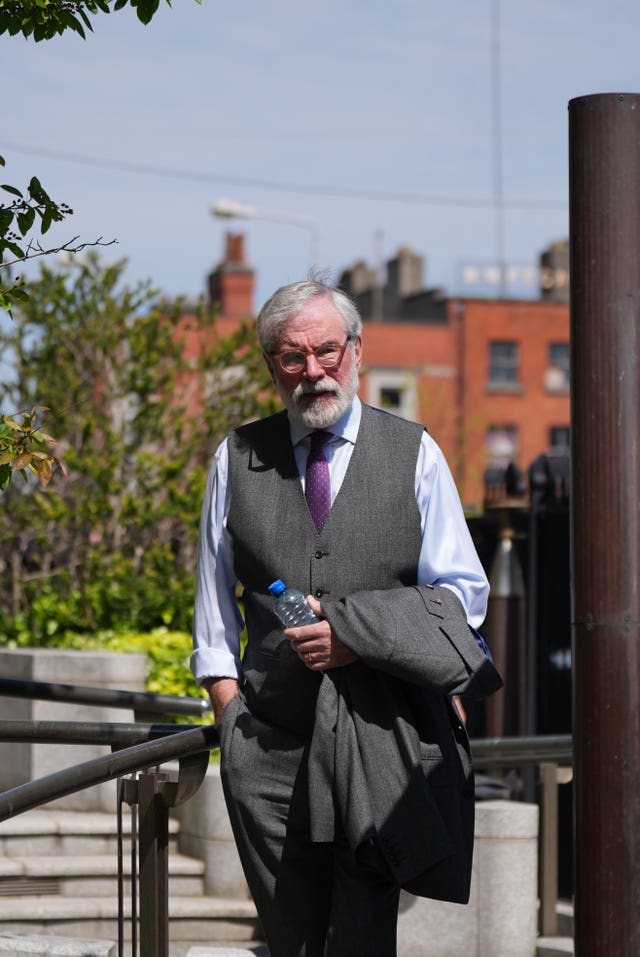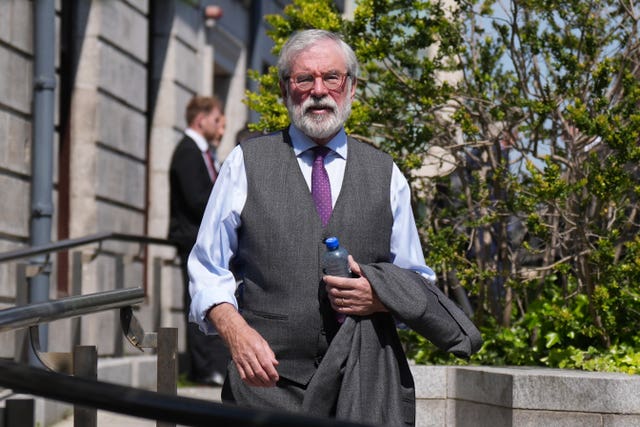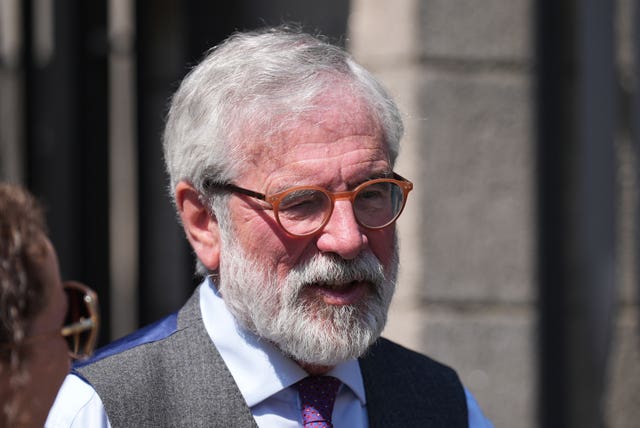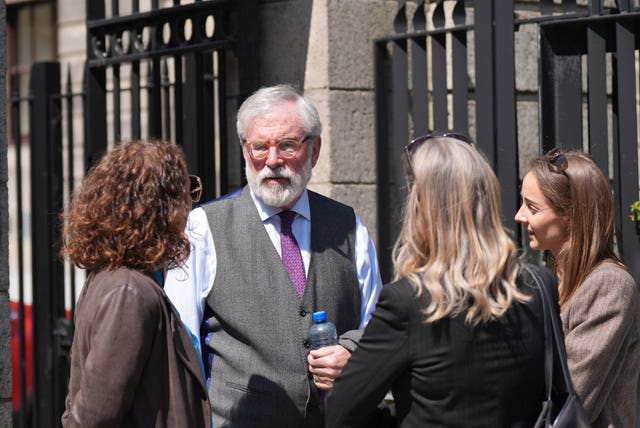Adams tells BBC case there are still people who think he ‘should be executed’
A former Sinn Fein official who was murdered after being revealed to be an informer was thrown ‘to the wolves’ by security services, Gerry Adams said.

A former Sinn Fein official who was murdered after being revealed to be an informer was thrown “to the wolves” by security services, Gerry Adams has told a libel trial.
Denis Donaldson was shot dead in 2006, months after admitting his role as a police and MI5 agent for 20 years.
Mr Adams is suing the BBC over what he deemed to be a “grievous smear” in a broadcast 10 years later that alleged he had sanctioned the killing.

The 76-year-old gave evidence for a sixth day as part of his defamation case against the broadcaster at the High Court in Dublin.
He claims a BBC Spotlight programme, and an accompanying online story, defamed him by alleging he sanctioned Mr Donaldson’s killing for which he denies any involvement.
In 2009, the Real IRA admitted killing Mr Donaldson and the Spotlight programme was broadcast in September 2016.
The trial opened last week with Tom Hogan SC, barrister for Mr Adams, saying the former Sinn Fein president’s reputation as a “peacemaker” had suffered an “unjustified” attack because of the broadcast of the BBC programme.
On Wednesday, Mr Adams continued taking questions from Paul Gallagher SC, barrister for the BBC, on a range of issues including Mr Donaldson’s role as an informer.
Mr Donaldson was one of multiple people who had been arrested as part of a police raid on Sinn Fein’s offices at Stormont in 2002 in search of documents that security services said the party had obtained illegitimately.
The charges were later dropped, and Mr Donaldson was revealed to be an informant before he was killed.
The “Stormontgate” spy ring scandal accelerated the collapse of powersharing, with the UUP pulling out of the institutions – and the secretary of state suspending the Assembly and Executive.
In court on Wednesday, Mr Adams said there was “spin” about a Sinn Fein spy ring and believed the purpose of the raid was to frighten unionist leadership.
He added: “The charges were dropped and then the news went out that Denis Donaldson was an informer and the only people who could have put that out were his handlers, the only people – nobody else knew, they put that out.”
Mr Adams said “elements of the securicrat”, who he deemed to be part of the security and intelligence services, thought Mr Donaldson was “disposable” and “threw him to the wolves”.
He also said an important part of the programme was the claim that the IRA had carried out the killing and that he had authorised it, which he said had been “asserted without any conditionality whatsoever”.

He said he took “grave exception” to the allegation, saying the killing came after efforts to bring about an end to the IRA’s campaign of violence and put its weapons beyond use.
Mr Adams said his concern related to his good name in his community, among his peers, and among those he persuaded that there was a way forward out of violence – which was accepted by a vast majority of them.
He said: “Now they were being told oopsie-daisy, the IRA hasn’t gone away, the IRA has killed this man Denis Donaldson, and more than that: Gerry Adams was up to his neck in it and authorised it.”
Mr Adams said he would not have subjected himself to the civil case if it was not for the “grievous” impact on his community, the Donaldson family and wider republican circles.
He added: “There’s still people out there that think we sold out, that we are traitors and should be executed.”
Asked by Mr Gallagher if he had taken up the broadcaster’s offer to conduct a pre-recorded interview or offer a written reply to the programme in advance, Mr Adams acknowledged he had been made aware of the allegations that were being made.
He said he did not avail of the interview as was his entitlement, and said that the allegations were “wrong” and made up of “weasel words”.
Mr Adams said the programme was to contain an allegation that a meeting he held with Mr Donaldson after he was revealed to be an informant was convened by the IRA and could be used as a court martial for him.
Mr Adams said this was incorrect and that it was he who asked for the meeting with Mr Donaldson under Sinn Fein structures, where he admitted to being an informer and was dismissed from the party under its own rules.
He said one did not “have to be a genius to see” what questions he would have been asked by Spotlight and alleged it was part of an agenda by the programme makers.
Mr Adams said: “Denis Donaldson was 10 years dead at this time and this came out of the blue – what was all that about?”
He added: “I have the right and entitlement not to co-operate with a programme that I think I’m justified in seeing as a straight ambush.”

He added that the second “hugely serious” allegation was that he had been consulted by the IRA Army Council and authorised the killing of Mr Donaldson.
Mr Adams said this was at a time when the IRA had “effectively stood down” and the Donaldson family were campaigning for truth.
Therefore, he said he “took umbrage” with the allegation and was “not prepared to engage”.
Mr Adams said his solicitor gave the BBC a reply denying the allegations.
Asked if he had received a full reply from the BBC on the matter, Mr Adams said: “I got an arrogant, offensive reply.”
He said the public service broadcaster had to be accountable for what it does.
Earlier, Mr Adams told the court that he had been legally advised he would not get “any sort of a fair hearing” by challenging several other claims that he had been a member of the IRA.
However, he said the allegation in the Spotlight broadcast was a “grievous smear” that “sets aside the huge work that was done” by him on the peace process and to persuade the IRA to “leave the stage”.
While stating he was not able to specifically remember individual articles that were raised by Mr Gallagher, Mr Adams acknowledged that claims about him being a member of the Army Council of the IRA had been raised multiple times in public.
He said he was doing this to save the court time as Mr Gallagher was “repeating questions time and time and time again”.
Mr Adams further accused Mr Gallagher of trying to persuade the jury that he did not have a reputation or that his reputation was “useless”.
He said the BBC’s lawyer was engaging in a “smothering saturation of the jury” with “obscure quotes” dating back 30-40 years.
Mr Adams said he brought allegations to his legal team as a matter of routine and added that he had repeatedly received legal advice that he would “not get any sort of a fair hearing” to challenge various claims made about him in the press.
However, he said he had taken action on a number of occasions by writing to editors or the Press Council which had resulted in retractions or apologies.
In the case of the action against the BBC, Mr Adams added: “That shows how seriously I take this allegation in the Spotlight programme, that I am suing.”

He said he had sued against what he considers to be an issue that “sets aside the huge work that was done” by him and others on the peace process.
Mr Adams said the import of the programme was that his work to end the campaign of violence “was a scam” and that the IRA Army Council had authorised the killing of Mr Donaldson and asked Mr Adams for permission.
He said he considered this to be a “lie” and “grievous smear” which “could have no other impact on the peace process but to undermine what was achieved”.
Mr Adams said his solicitor had made a “strenuous effort” to get the BBC to deal with the matter outside of the courts, noting it was licence fee payers for the broadcaster that were paying for Mr Gallagher’s services.
Asked if he was “appalled” by allegations that he was involved in the crimes of the IRA Army Council dating back decades, he said he would not use that word but would say he was “irritated”.
Mr Adams said allegations about him were “getting in the way” of his engagements on the peace process.
When Mr Gallagher raised how many people had been killed by the IRA, Mr Adams said: “Please don’t lecture me on the number of people who have been killed,” adding that he gave thanks that a peace process had been put together to stop that.
He said he did not want to be egotistical as he considered himself to be as “flawed as anybody else” in the room, adding: “I don’t go around trumpeting my achievements.”
However, he said he had – with others – achieved a peace process and built Sinn Fein to the largest party on the island.
Mr Adams said he acknowledged there were various allegations and assertions about his alleged involvement with the IRA and its crimes across various forms of media, including books, television and newspaper, spanning a period of decades.
However, he said he never acknowledged their accuracy nor correctness – adding: “In fact, I deny them.”
Mr Adams added: “There are of course some folk who want to fight the war all over again and set aside the progress that has been made – and that includes those who killed Denis Donaldson, and I’m sure whoever it was who would like to see me dead as well.”
The case continues.





